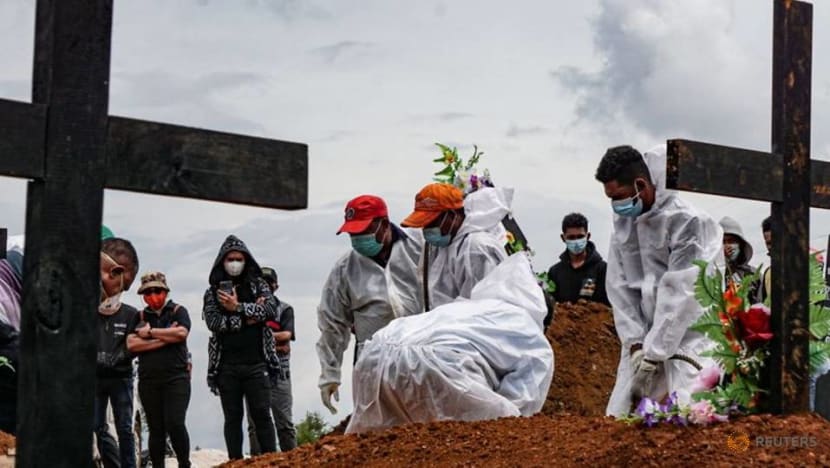WHO warns of 'long term' COVID-19 impact on mental health

Gravediggers wearing personal protective equipment (PPE) burry a coffin at a burial area provided by the government for coronavirus disease (COVID-19) victims, as cases surge in Jayapura, Papua, Indonesia July 20, 2021, in this photo taken by Antara Foto/Indrayadi TH/via REUTERS
ATHENS: The mental health impact of the pandemic will be "long-term and far-reaching", the World Health Organization said Thursday (Jul 22), as experts and leaders called for action on pandemic-linked anxiety and stress.
"Everyone is affected in one way or another," the WHO said in a statement at the start of a two-day meeting in Athens with health ministers from dozens of countries.
It said "anxieties around virus transmission, the psychological impact of lockdowns and self-isolation" had contributed to a mental health crisis, along with stresses linked to unemployment, financial worries and social alienation.
"The mental health impacts of the pandemic will be long term and far-reaching," the statement added.
READ: Commentary: Worries over COVID-19 situation are taking a mental toll on Singapore
The WHO's regional director for Europe Hans Kluge said mental health should be considered a "fundamental human right", stressing how the virus had torn lives apart.
"The pandemic has shaken the world," he told the conference.
"More than four million lives lost globally, livelihoods ruined, families and communities forced apart, businesses bankrupted, and people deprived of opportunities."
The WHO called for the strengthening of mental health services in general and the improvement of access to care via technology.
It also urged better psychological support services in schools, universities, workplaces and for people on the front line of the fight against COVID-19.
The ministers heard from a 38-year-old Greek woman called Katerina who told them how she had been receiving treatment for a psychiatric disorder since 2002 and had been coping well until the pandemic hit.
She was no longer able to attend in-person support groups and could not see her father, forcing her to boost her treatment.
"The pressure of social isolation led to increased anxiety," she said.
BOOKMARK THIS: Our comprehensive coverage of the COVID-19 pandemic and its developments
Download our app or subscribe to our Telegram channel for the latest updates on the coronavirus outbreak: https://cna.asia/telegram










